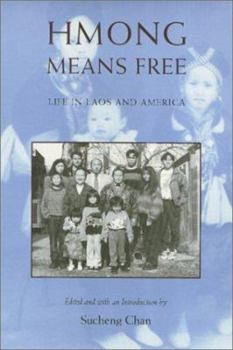Hmong Means Free: Life in Laos and America
Select Format
Select Condition 
Book Overview
This collection of evocative personal testimonies by three generations of Hmong refugees is the first to describe their lives in Laos as slash-and-burn farmers, as refugees after a Communist government came to power in 1975, and as immigrants in the United States. Reflecting on the homes left behind, their narratives chronicle the difficulties of forging a new identity. From Jou Yee Xiong's Life Story: "I stopped teaching my sons many of the Hmong ways because I felt my ancestors and I had suffered enough already. I thought that teaching my children the old ways would only place a burden on them." From Ka Pao Xiong's (Jou Yee Xiong's son) Life Story: "It has been very difficult for us to adapt because we had no professions or trades and we suffered from culture shock. Here in America, both the husband and wife must work simultaneously to earn enough money to live on. Many of our children are ignorant of the Hmong way of life.... Even the old people are forgetting about their life in Laos, as they enjoy the prosperity and good life in America." From Xang Mao Xiong's Life Story: "When the Communists took over Laos and General Vang Pao fled with his family, we, too, decided to leave. Not only my family, but thousands of Hmong tried to flee. I rented a car for thirty thousand Laotian dollars, and it took us to Nasu.... We felt compelled to leave because many of us had been connected to the CIA.... Thousands of Hmong were traveling on foot. Along the way, many of them were shot and killed by Communist soldiers. We witnessed a bloody massacre of civilians." From Vue Vang's Life Story: "Life was so hard in the [Thai refugee] camp that when we found out we could go to the United States, we did not hesitate to grasp the chance. We knew that were we to remain in the camp, there would be no hope for a better future. We would not be able to offer our children anything better than a life of perpetual poverty and anguish."
Format:Paperback
Language:English
ISBN:1566391636
ISBN13:9781566391634
Release Date:April 1994
Publisher:Temple University Press
Length:267 Pages
Weight:1.10 lbs.
Dimensions:0.7" x 6.0" x 9.0"
Customer Reviews
4 ratings
Hmong Means Free
Published by Thriftbooks.com User , 14 years ago
Whether or not the meaning of "Hmong" LITERALLY means "free" or not, I'm SURE, is not what the author is trying to say.
Helping young Hmong Americans find and identity...
Published by Thriftbooks.com User , 21 years ago
I work in the healthcare field and have seen quite a few young (teenage +) Hmong Americans struggling with their sense of value. In particular, a young girl who had been "Americanized" AKA taken from her family when she was young because of supposed abuse - a common practice not that long ago. She was depressed, living with a loving but very white family in which she felt inferior. Asian gang activities in our area made her feel embarrassed. This book put a spark back in her eyes. I found it wonderful and would highly recommend it.
Tragic Mountain
Published by Thriftbooks.com User , 22 years ago
I would like to take this opportunity to thank you so much for all author or editor to do a research on Hmong.We have strugle and fight for freedom for many many years start from China to Laos, and now USA. I have a chance to came to America as Hmong. I feel so lucky to be in USA and have a chance to get higher education.In my personal opinion, since I was born in Laos my parent told mthat we are Hmong and we are human, we a people. But the majority Lao and government call us Meo and neve willing to fix it and call us the way we want. To me the Meo never accept in the Hmong people but we must respect the majority rule, and because we are the monority. Today, we Hmong are proud to our leader Gen. Vang Pao allie with the US and bring the Hmong to America. Do you know what happen? Now, we got want we want, we can we that we are Hmong. I agree with Chen define "Hmong Mean Free" Hmong mean people and mean Human being and also in US we are Free. No one call us Meo, or Miao no more. I amso proud and hope it last and forever that Hmong mean people, Human, and Free.Thank you again for all author for your hard work on our Hmong People.Sincerely,Peter Thao, MSCommunication Technolgy UW-STOUTWisconsin
Hmong History
Published by Thriftbooks.com User , 24 years ago
The stories in this book were true story for the Hmong. If you didn't know who are Hmong and where they came from. You better read this book. It is every a good book. After you read this book, you also get information from Hmong culture. The book talked about Hmong history from China, joined with CIA when the Vietnam War, how hard their lives and also how hard they had moved from country to country. The book also included story by each person. After I read the stories in this book, I felt very interesting and enjoying with. Hmong Means Free, because Hmong was a group that didn't like to live by law control. For me, I understand that Hmong had joined the law when general Vang Pao become a Hmong leader. He was the first one that forced the Hmong to join with the law and had education with other foreign people.





